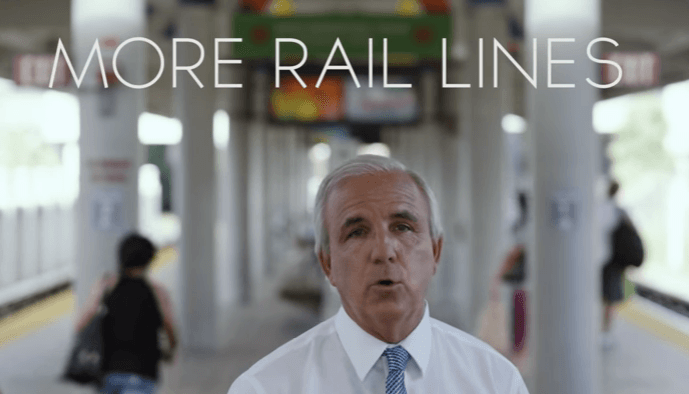Miami-Dade County Mayor Carlos Gimenez is in charge of executing an ambitious transit expansion plan -- but lately, in a spectacular example of missing the point, he's been talking up autonomous cars as the ultimate transportation solution.
During a meeting earlier this month about a possible southward Metrorail expansion, part of the countywide SMART plan, "Gimenez reportedly floated the idea of using high-tech buses as a transition to a transportation revolution: the arrival of autonomous cars and their ability to revolutionize highway travel," local officials told the Miami Herald.
The Herald interviewed Gimenez last week:
He went on to suggest autonomous vehicles might make costly transit systems obsolete. “New technology is coming,” he said. “And that new technology may have tremendous consequences. Automated cars, but also automated buses.”
This isn't the first time Gimenez has fixated on self-driving cars.
In 2015, after seeing a segment about autonomous cars on local TV news, the mayor made an unsolicited call to the station to share his interest in the topic. "That technology is going to get here way before anybody thinks it's going to get here," he told WPLG. "It is one of those technologies that really changes everything."
The next year, Gimenez announced a "pilot program in which several autonomous vehicles would be used to transport people around Miami" by late 2016, according to a press release from IBM touting a fleet of 12-passenger autonomous electric vehicles.
“We must do more to improve transit and mobility in our community and the deployment of autonomous vehicles is a big step in the right direction," Gimenez said in the press release.
But those self-driving vehicles have yet to materialize on Miami-Dade's streets because of "delays in the technology and the manufacturing of the vehicles," according to mayoral spokesperson Michael Hernandez.
Could it be that self-driving cars aren't coming that soon?
"Although Mayor Gimenez is enthusiastic about the autonomous vehicle technology, he understands that the tech isn't smart enough to be put into real-world use at this time," Hernandez said. "When the autonomous technology is better refined, it is an option Miami-Dade will certainly be in favor of testing."
The mayor's focus on whiz-bang technology misses the point, says Marta Viciedo, co-founder of the Urban Impact Lab, a Miami-based civic engagement consultancy. Instead of looking ahead to an uncertain technology that won't solve the spatial efficiency problem of cars in cities, Giminez should embrace the proven policies under his nose.
The SMART plan identifies the right corridors to beef up transit, Viciedo said, but new transit won't succeed unless it's accompanied by dense, walkable, and affordable neighborhoods -- something that's all too rare in sprawling Miami-Dade.
“We have not done a good job historically of tying transit to land use," Viciedo said. “We build transit, and take it to areas without the density to support transit, and then people don’t want to ride it. We’re setting it up for failure.”
While county transportation officials she's spoken with understand the need for Miami-Dade to connect the dots between land use and transportation, Viciedo said, the mayor's focus on autonomous cars indicate that he might not get it.
"I am not convinced that there’s a fundamental full understanding,” she said.
Andrew Frey, a developer who serves on the board of the South Florida Regional Transportation Authority, said he's glad the mayor is thinking ahead about driverless cars, but that there's an immediate need to invest in transit and walkable neighborhoods. “The mayor’s right to... keep us thinking about the role that cars will play, whether they’re driven by a person or a robot, but at the same time, we’ve made commitments, we’ve set aside funds, we’ve committed to a plan, and now we need to execute on it," he said. “I don’t think it makes any sense to commit to investment in transit unless you’re willing to go with a transit-oriented pattern of development, and that includes high density and eliminating parking requirements."
"It’s not just about transit. It’s about how you build a city. It’s about how you build a whole system," Viciedo said.






